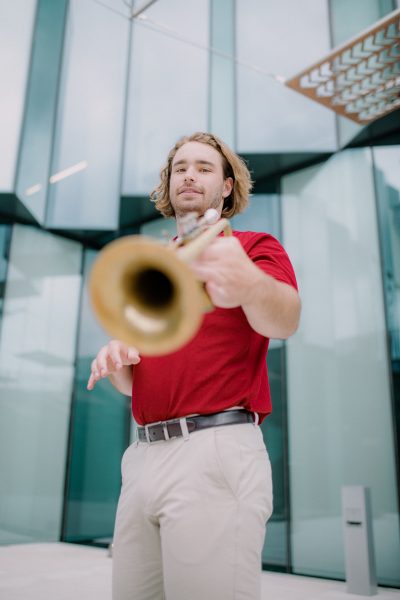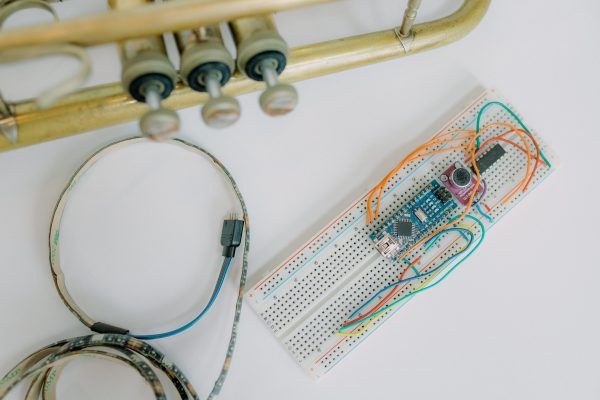
This is part of a series of articles that will be posted in August sharing the stories of recent LAS alumni who were part of this summer’s CYstarters cohort at the ISU Pappajohn Center for Entrepreneurship.
Jacob Schmieder (’21 biochemistry) is passionate about learning, especially science. As a middle school student in Little Chute, Wisconsin, his interest in chemistry, biology and engineering took root. Throughout high school, his affinity for science blossomed, eventually leading him to Iowa State, where he earned a bachelor’s degree in biochemistry with a physics minor in spring 2021. Now, Schmieder is staying at Iowa State to pursue a master’s degree in mechanical engineering while also preparing for medical school. One day, he hopes to specialize in cardiology.
With a propensity for chemistry and engineering, one might think Schmieder’s first foray into entrepreneurship would involve developing artificial medical devices to aid ailing heart patients. And while those endeavors may be part of his future professional career, Schmieder’s electrifying innovation will get hearts pumping in a much different way.
He saw the light
Schmieder is also passionate about the Iowa State University Cyclone Football “Varsity” Marching Band. As an undergrad, he played trumpet in the band and later took the helm as a drum major, a role he’ll continue while in graduate school.
“Being in the marching band, that is the best thing I’ve done at Iowa State, hands down,” he said.
The inspiration for Schmieder’s innovation hit him while at the annual Band Extravaganza during his sophomore year at Iowa State. At that show, the drum line’s performance struck a chord with him.
“The drum line rose up out of the orchestra pit and had sound-activated lights, so every time they hit their drums, the drums lit up and everyone went nuts,” he said. “I was like that would be really cool to be able to put that on my trumpet.”
At the same time, Schmieder was searching for an Honors Program project. Inspired by the drum line performance, he decided to create sound-activated lights that could be attached to all band instruments. Eventually, the idea morphed into a business plan that landed him in the summer 2021 CYstarters cohort.
Kickstarting innovation
Sponsored by Iowa State’s Pappajohn Center for Entrepreneurship, CYstarters is a competitive 11-week summer accelerator for Iowa State students or recent graduates to focus on developing their business ideas. For Schmieder, coming up with the idea for his product—Varsity Instrument Lights—was the easy part. Turning the concept into a marketable business idea was a bit more daunting.
“I have absolutely no background in business, so I came into CYstarters with no idea as to what I’m doing,” he said. “I’m trying to soak up as much information as I can to get the tools, or at least the background knowledge, of every aspect of business.”
CYstarters has connected Schmieder to people and resources that have helped him research a potential customer base, develop manufacturing contacts and refine a marketing plan.
Diana Wright, a startup community builder with the Greater Des Moines Partnership, was previously a program and marketing coordinator with the Pappajohn Center. She was instrumental in assisting Schmieder with transitioning his product from concept to reality, and has no doubt that his passion for the marching band will propel him towards entrepreneurial success.
“Jacob founded this idea by way of experiencing it as a performer in the ISU Marching Band,” Wright said. “Right away, he can relate to the audience he is targeting and is a familiar face to the industry through the relationships he has built during his time at Iowa State.”

Working through the details
Schmieder spent this summer refining the Varsity Instrument Lights prototype and solidifying his business plan. The prototype consists of a component that houses a tiny computer and a 9-volt battery, which is connected by wires to a microphone and a multi-colored light strip. The lights wrap around the bell and the housing is attached to the instrument with Velcro straps or a lyre. Schmieder has programmed musical notes to coordinate with certain colors, so each time a musician plays the musical note B-flat, for example, a green light flashes.
“I’m taking the frequency of the note and once we have that information, we can do whatever we want with the lights,” he said.
Schmieder has also added new members to his product team. All are Iowa State students who will assist him with marketing, circuitry and coding.
Teaching tool
Aside from creating audience excitement, Schmieder believes his product could teach young band members how to train their ears to correctly tune their instruments.
“The lights can act as a tuner. If you’re teaching younger kids how to train their ears, everything outside of a small interval of the true note may be red and everything in that small correct range is green. Once they are green, they know they are in tune. They can hear that as they see what is actually happening,” he said.
In addition, Schmieder thinks Varsity Instrument Lights may entice kids to stick with their school music programs.
“My band program in 5th grade was 50 to 60 people, and by the time I got to high school, the entire band was 50 people. The drop off is super steep,” he said. “Knowing you get to put lights on your instrument for one rehearsal a week, or you get to use them in a performance can be something that will engage students enough to keep them around the arts longer.”
New opportunity
When Schmieder came to Iowa State four years ago, he never imagined becoming an entrepreneur, but he’s grateful for the new learning opportunity. That passion for learning, he said, is key to the success of student innovators.
“If you’re open to wanting to learn and engage in that space, nothing is going to stop you,” Schmieder said. “The learning process involves taking criticisms, failures and applying your failures to then have success. I think having open-mindedness and the will and want to learn and to grow is what is most important.”